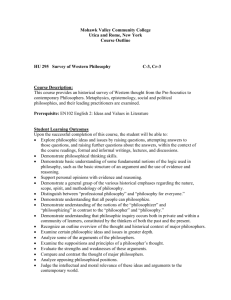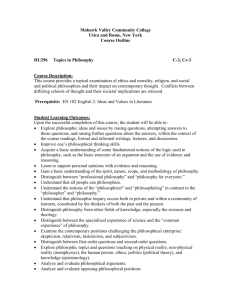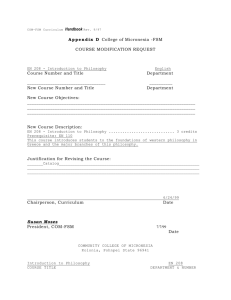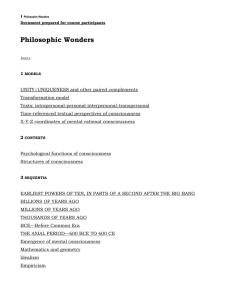NAU EDL Philosophy of Education Study Guide
advertisement
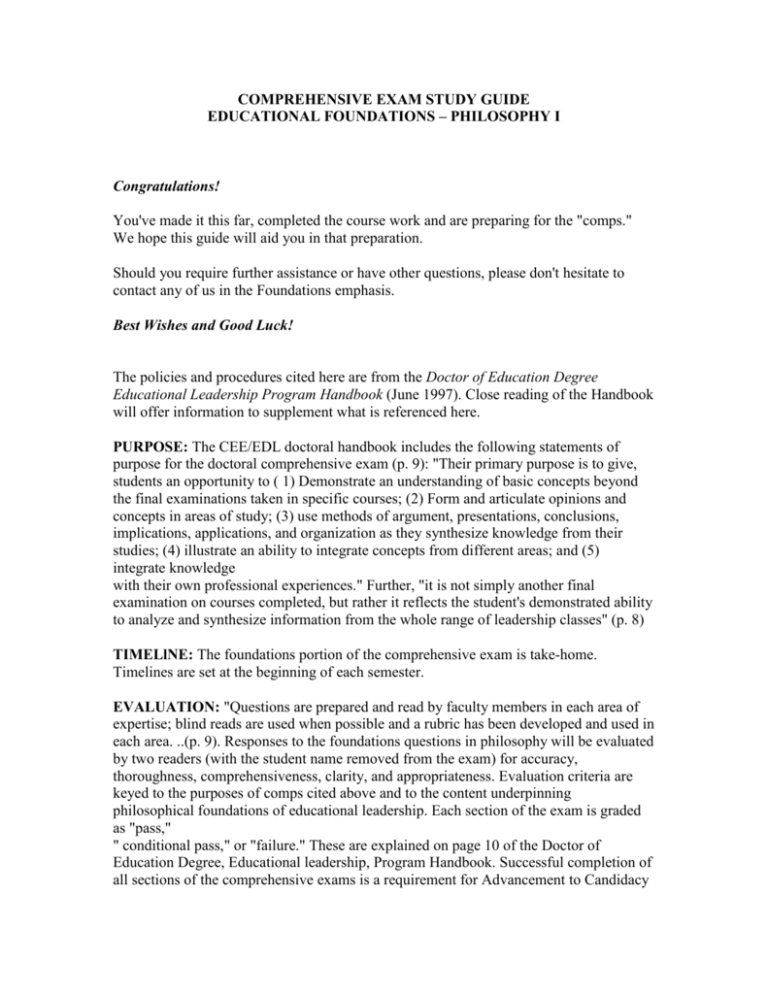
COMPREHENSIVE EXAM STUDY GUIDE EDUCATIONAL FOUNDATIONS – PHILOSOPHY I Congratulations! You've made it this far, completed the course work and are preparing for the "comps." We hope this guide will aid you in that preparation. Should you require further assistance or have other questions, please don't hesitate to contact any of us in the Foundations emphasis. Best Wishes and Good Luck! The policies and procedures cited here are from the Doctor of Education Degree Educational Leadership Program Handbook (June 1997). Close reading of the Handbook will offer information to supplement what is referenced here. PURPOSE: The CEE/EDL doctoral handbook includes the following statements of purpose for the doctoral comprehensive exam (p. 9): "Their primary purpose is to give, students an opportunity to ( 1) Demonstrate an understanding of basic concepts beyond the final examinations taken in specific courses; (2) Form and articulate opinions and concepts in areas of study; (3) use methods of argument, presentations, conclusions, implications, applications, and organization as they synthesize knowledge from their studies; (4) illustrate an ability to integrate concepts from different areas; and (5) integrate knowledge with their own professional experiences." Further, "it is not simply another final examination on courses completed, but rather it reflects the student's demonstrated ability to analyze and synthesize information from the whole range of leadership classes" (p. 8) TIMELlNE: The foundations portion of the comprehensive exam is take-home. Timelines are set at the beginning of each semester. EVALUATION: "Questions are prepared and read by faculty members in each area of expertise; blind reads are used when possible and a rubric has been developed and used in each area. ..(p. 9). Responses to the foundations questions in philosophy will be evaluated by two readers (with the student name removed from the exam) for accuracy, thoroughness, comprehensiveness, clarity, and appropriateness. Evaluation criteria are keyed to the purposes of comps cited above and to the content underpinning philosophical foundations of educational leadership. Each section of the exam is graded as "pass," " conditional pass," or "failure." These are explained on page 10 of the Doctor of Education Degree, Educational leadership, Program Handbook. Successful completion of all sections of the comprehensive exams is a requirement for Advancement to Candidacy (p. 10). There is a 60-day period required between receiving Advancement to Candidacy status and dissertation defense. FORM: Students will be given a choice of three questions for the examination and must elect two to complete and submit. The questions will be set in a professional scenario with the writing task and purpose given and the audience for the writing specified. Example: The Executive Committee of the Arizona School Boards Association has requested a working paper on the influence of two major philosophic viewpoints on current scho@l reform initiatives. They will use this working paper as background for their planning of orientation sessions for new board members throughout the state. Select two philosophic viewpoints, discuss each and illustrate the presence and impact of each in discussions of specific reform initiatives Oike charter schools, performance-based testing, essential skills). Use APA documention style in the preparation of your work. STUDY ASSISTANCE: "Individual area faculty members provide study guidelines for this portion of the examination" (p. 9). "Well in advance of the comprehensive examination session the student should contact his/her advisory and discuss specific study recommendations" (p. 9). "Students are advised to contact individual faculty members for reading sugestions and study guides for each portion of the examination. Many students find it useful to organize study groups to share resources" (p. 9) CONCEPT GUIDE: Note: In philosophy the labels of "categories" may vary from text to text, but they can be roughly organized into three conceptual major streams of "traditional," "progressive," and "radical." Some texts identify a macro structure that is more related to a linear timeline (classical, traditional, and contemporary). Which organizing scheme or labels you use is of secondary importance; you need to have some organizing structure to assist you in thinking through philosophic foundations as they impact contemporary educational issues. Your grounding in the theory should enable you to understand (i.e. describe, compare, contrast, assess) specific approaches to thinking about issues in educational reform and leardership. (For example, the professional literature may include references to philosophic labels such as the following: essentialism, existentialism, idealism, naturalism, neo-pragmatism, perennialism, pragmatism, progressivism, realism, social reconstructionism). You are expected to draw from primary source readings in addition to using secondary sources. These are some of the major topics with which you should have familiarity: The relationship between the philosophic "content areas" (metaphysics, epistemology, axiology) and educational thought. Traditional, progressive, and radical philosophic perspectives: their presuppositions, their defining characteristics, their proponents, their critics, their inter-relationships, their theoretical and applied aspects, historical and contemporary examples. An understanding of touchstone documents, key people, key questions of focus, and key educational issues for more than a single perspective is expected. The nature of analytic philosophy and its impact and influence on educational thinking. The nature of philosophic inquiry: its characteristics, its benefits, its pitfalls. The perennial issues with which educational philosophy has been concerned. REFERENCES: These are some of the major people with which you should be familiar. This is not an all-encompassing list, but one to assist you in identifying the stature and impact of people upon whose thought you should be able to draw. Mortimer Adler Aristotle Arthur Restor Theodore Rrameld George Counts John Dewey Michel Foucault Paulo Freire Friedrich Foebel Carol Gilligan Henry Giroux Maxine Greene William James Hegel Robert Hutchins Ivan lllich William James Immanuel Kant Soren Kierkegaard Matthew Lipman John Locke Jane Rowland Martin Gareth Matthews John Stuart Mill Nel Noddings Plato Richard Rorty Rousseau Harold Rugg Sartre Israel Scheffler Socrates Alfred Whitehead A few additional suggestions: (If it has been awhile since you have used philosophic perspective as a lens to think about education, here are a few additional possibilities of how to begin again). A helpful overview of the field today can be found in Maxine Greene's entry, "Philosophy and Teaching" and in "Philosophy of Research on Teaching: Three Aspects," by Gary Fenstermacher both essays in the Handbook of Research on Teaching: Also see "Philosophical Inquiry in Teacher Education," by Robert Floden and Margaret Buchmann in Handbook of Research on Teacher Education. There are a series of yearbooks put out by the Philosophy of Education Society (simply titled Philosophy of Education and the year of the collection) and the journal of that society , Educational Theory will provide a glimpse at topics under discussion today. The field has many texts that while providing general overviews, also draw on a familiarity with primary sources (see George Knights' Issues and Alternatives in Educational Philosophy, Nel Noddings', Philosophy of Education, Cornell Hamm's Philosophic Issues in Education Wendy Kohli's Critical Conversations in Philosophy of Education, Barbara Thayer-Bacon's Philosophy Applied to Education as examples). As a way of studying, trace the philosophic lineage of your own perspectives on teaching, on schooling, on the nature of students, on curriculum, on the role of school leaders (e.g., Are you more likely to have an argument with Dewey or Locke? If you could consult with a philosopher in planning the opening of a new school, would you be more likely to seek out Rousseau or Whitehead? In planning for community involvement in a school you are leading, would you be more likely to be informed by the work of Freire or Adler?). Similarly, it can be helpful to think about the complementary and contradictory philosophic perspectives around your dissertation topic. Scoring criteria: The philosophy questions will be scored using this descriptive criteria. A. Responsiveness to tasks identified in the question Specific scoring items directly related to the requirements set out in the question itself. B. Accuracy -apparent in use and interpretation of sources -generally evident, but limited in interpretation -mistakes in use and interpetation of sources -obvious inaccuracies C. Thoroughness -details demonstrate comprehensive understanding -generalities illustrate general understanding -few details, minimal (or lack of) understanding evident -theoretically thin generalizations D. Relationship between theoretical & applied practices -pedagogical practices coherent with theoretical base -practices related to theory but explanation of the tie not explicit -few practices (or litnited theory) evident -absence of relationship between theory and practice
